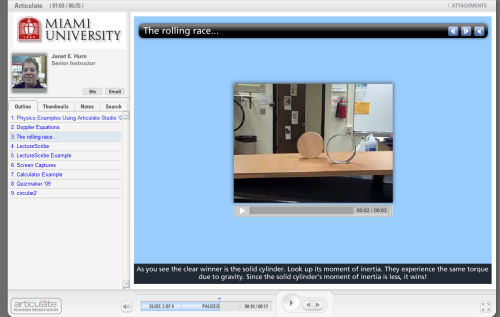Articulate-Powered Physics: Miami University Case Study
This guest blog entry was written by Articulate EVP of Sales & Marketing Mark Schwartz.
Think about the world’s greatest thinkers. Certainly Albert Einstein, Marie Curie, Stephen Hawking, and Dr.Werner Oppelbaumer come to mind. What do they all have in common? They are all physicists (most don’t know Oppelbaumer was a trained physicist, but he left physics and became an e-learning pioneer after an unfortunate uranium accident, but that’s a story for another day).
Let’s face it — physics is tough. At least that’s what most people who’ve taken a physics course would say. But, that’s just not so, according to Professor of Physics Janet Hurn, at the Miami University, Ohio – Middletown campus.

“Sure, physics is intimidating,” she admits, “but it’s not difficult, if taught properly.”
The Search for a Solution
Enter Articulate and Hurn’s quest to change the way her students learn physics. Her story begins when she and the Center of Online Learning (CoOL) was asked by Miami University to assist the school of nursing in developing distance learning courses. CoOL realized that part of that task included evaluating solutions that would enable faculty to easily develop elearning course materials. Hurn holds an undergraduate degree in physics and a master’s degree in education. She has a real passion for educational technology so she also serves as the university’s part-time Director of CoOL.
 The nursing school urgently needed to develop curriculum for associate degree nursing students who were seeking a bachelor’s degree in nursing. Most of the nurses worked odd shifts, so attending traditional lecture classes was not an option. The evaluation team, led by Hurn, recommended Articulate Rapid E-Learning Studio as the technology to assist creating the online courses, and the school of nursing has never looked back.
The nursing school urgently needed to develop curriculum for associate degree nursing students who were seeking a bachelor’s degree in nursing. Most of the nurses worked odd shifts, so attending traditional lecture classes was not an option. The evaluation team, led by Hurn, recommended Articulate Rapid E-Learning Studio as the technology to assist creating the online courses, and the school of nursing has never looked back.
Says Hurn:
“Our lectures were PowerPoint-based, so Articulate Presenter was a natural fit. The fact that our instructors and course authors could work within PowerPoint and easily enhance the courses for online learning was exciting in and of itself. But when we realized we could easily create and add engaging quizzes with Quizmaker and impressive interactions with Engage, Articulate Studio Pro became a no-brainer.”
A Hybrid Approach to Learning
Hurn took what she learned in her work for the nursing school and applied it to her physics classes. She introduced a hybrid learning approach similar to what Brian McFarlin offers at the University of Houston.
Instead of meeting three days a week, she now holds class two days a week and creates an e-learning course that students review over the weekend. The Monday class begins with a quiz. Students can use notes they took from the online course and answer questions via a real-time response clicker. Based on instant results, Hurn is able to customize her Monday review session based on areas that need additional attention.
Check out this Articulate-powered presentation about Hurn’s favorite features of Studio ’09:
View Hurn’s favorite features presentation
The results have been impressive. Hurn has observed the following:
- What previously took one hour in a classroom lecture, she’s now able to deliver in a 15-minute e-learning course.
- The Articulate-authored courses provide for easy navigation and allow students to repeat sections or even skip sections altogether. This allows students to learn at their own pace.
- Class time can be used for more lab-oriented or collaborative activities.
- Some lab demonstrations are difficult to reproduce. She purchased a Flip Video recorder and records her lab demonstrations. Then, using the Articulate Video Encoder ’09, she converts those videos to a Flash Video (FLV). Now she’s able to introduce the labs whenever she wants into the Articulate courses and quizzes.
- Using LectureScribe (a free software product developed by Brian C. Dean, Clemson University) and her tablet PC or Wacom tablet, she’s able to work through equation examples and easily insert them into Articulate courses. Some students will need to go through this once, but others may need to go through it multiple times to fully comprehend it.
- Student satisfaction and performance have improved: 88% of students agreed that the presentations were helping their learning.
What’s next for Hurn?
“I continue to challenge myself to improve my teaching approaches,” Hurn says. “I really want to improve the quality of my e-learning courses, and I’ve become a real fan of the Rapid E-Learning Blog.”
Her success has motivated others at Miami University to follow her lead. A mandatory safety training course was created in Articulate by colleague Andrea Han so that all staff could review it.
The university is now looking to hire a full-time director of online education. Is Hurn interested in applying for that position?
Says Hurn:
“I’m an educator at heart. So I’m not going to apply for that position. But, I’ll continue to explore ways to make physics easy to learn and work with other interested faculty. And, I’m certain that e-learning and Articulate software will continue to play a key role in that ongoing journey.”
Hear Brian McFarlin’s incredible story of student improvement with e-learning at Articulate Live ’09.


3 responses to “Articulate-Powered Physics: Miami University Case Study”
Great work. A job well done.
[…] to Janet Hurn, I was introduced to LectureScribe. She teaches physics at Miami University, Ohio and uses it […]
Hi dear
I am Ali Servat, teach physics in high school in Iran.
I am working on new methods of teaching in physics especially in e-learning.
so i have made some programs with power point and animations about physics topics.
please give me some information about applying and educating in e-learning in your university or other universities.
It’s my pleasure to cooperation together.
please contact me.
with great appreciate
Ali Servat
Comments are closed on this post. Need more help? Post your question in the E-Learning Heroes Discussions.